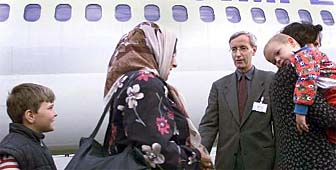Swiss lead efforts to improve lot of migrants

Switzerland is launching an ambitious new initiative aimed at establishing international guidelines for the treatment of migrants. The Berne Initiative, as it is known, is the brainchild of the Swiss Federal Office for Refugees.
A two-day conference is underway in Bern, aimed at defining common ground between countries on the issue of migration. The meeting has attracted over 60 delegates from 30 different nations.
One of the main problems regarding migration is that there are no international principles or conventions for dealing with the phenomenon. Migrants are therefore often confused with refugees and asylum seekers, whose treatment is determined by the 1951 Geneva Convention.
Jean-Daniel Gerber, who is head of the Swiss Refugee Office and is also chairing the two-day migration conference, said the confusion between migrants and refugees caused problems.
“Migrants do come to our country for very valid reasons,” said Gerber, “but they are not reasons of persecution. Treating them as refugees causes mix ups and is damaging to the refugees themselves. We really need to find a new instrument to deal with migration that is not due to persecution.”
The Berne Initiative has the full backing of the International Organisation for Migration (IOM). Brunson McKinley, the director general of IOM, told the conference of the need to change the negative image many people have of migrants.
“The whole debate is very unsophisticated,” said McKinley. “It often degenerates into anti-foreigner sentiment. We really need to recognise that migrants fulfil a very useful economic function; they are moving to new countries to take up jobs.”
It is estimated that of the world’s 6.2 billion people, 150 million are currently on the move. This trend looks set to continue for the next 50 years at least. Western Europe in particular can expect many new migrants, because falling birth rates in European countries will lead to domestic labour shortages.
But even though many countries need migrants, migration remains a sensitive issue. Attempts in the past to establish international guidelines for dealing with migration have failed. Jean Daniel Gerber agreed that the Berne Initiative is an ambitious plan.
“It is very ambitious,” said Gerber. “Especially when we see that all past attempts failed. But the mood has changed since the end of the Cold War. The process starts now, and we hope that we will be able to identify common ground that will eventually lead to the development of guidelines.”
Gerber believes three or four common topics will be highlighted by the Berne Initiative’s first conference, including the return of illegal migrants, the brain drain of well qualified migrants from developing countries to developed ones, and the trafficking of women and children.
Although the Berne Initiative is unlikely to lead to a Geneva Convention on migrants overnight, it is at least a first small step on the long road towards a better understanding of what migration is, and consequently result in a fairer treatment of migrants.
by Imogen Foulkes

In compliance with the JTI standards
More: SWI swissinfo.ch certified by the Journalism Trust Initiative
You can find an overview of ongoing debates with our journalists here . Please join us!
If you want to start a conversation about a topic raised in this article or want to report factual errors, email us at english@swissinfo.ch.